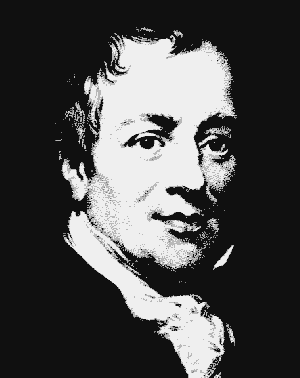Ri
Ribot, Alexander (1842-1923)
French Moderate Republican. Deputy from 1878. Premier of France, March-September 1917.
Ricardo, David (1772-1823)
 English economist who gave systematised and classical form to the rising science of economics. His laissez-faire doctrines were typified in his Iron Law of Wages, which stated that all attempts to improve the real income of workers were futile and that wages perforce remained near the subsistence level.
English economist who gave systematised and classical form to the rising science of economics. His laissez-faire doctrines were typified in his Iron Law of Wages, which stated that all attempts to improve the real income of workers were futile and that wages perforce remained near the subsistence level.
Ricardo was the third son of a Dutch Jew who had made a fortune on the London Stock Exchange. At the age of 14 he entered his father's business. By 21, he had become a Unitarian, and married a Quaker. He continued as a member of the stock exchange, and in a few years acquired a fortune.
His interest in economic questions arose in 1799 when he happened to read Adam Smith's Wealth of Nations. His first published work was The High Price of Bullion, a Proof of the Depreciation of Bank Notes (1810), asserting that there was a close connection between the volume of bank notes and the level of prices and that the level of prices in turn affected foreign exchange rates and the inflow or outflow of gold.. A committee appointed by the House of Commons, known as the Bullion Committee, confirmed Ricardo's views and recommended the repeal of the Bank Restriction Act which had obliged the Bank to withhold payment in gold under the strain of war with France.
At this time Ricardo became friends withs the philosopher and economist James Mill (father of John Stuart Mill), the Utilitarian philosopher Jeremy Bentham and Thomas Malthus, best known for his theory that population tends to increase faster than the food supply.
In 1815 another controversy arose over the Corn Laws. A decline in wheat prices had led Parliament to raise the tariff on imported wheat. This provoked a popular outcry and caused Ricardo to publish his Essay on the Influence of a Low Price of Corn on the Profits of Stock (1815), in which he argued that raising the tariff on grain imports tended to increase the rents of the country gentlemen while decreasing the profits of manufacturers.
In his Principles of Political Economy and Taxation (1817), Ricardo undertook to analyse the laws determining the distribution of the social product among the "three classes of the community," namely, the landlords, the workers, and the owners of capital. He applied his findings more widely, however, and elaborated various other economic principles. He found the relative domestic values of commodities to be dominated by the quantities of labour required in their production, rent being eliminated from the costs of production.
He concluded that profits vary inversely with wages, which move with the cost of necessaries, and that rent tends to increase as population grows, rising as the marginal costs of cultivation rise. He supposed that there was little tendency to unemployment; but he remained apprehensive lest population grow too rapidly, depress wages to the subsistence level, and, by extending the margin of cultivation, reduce profits and check capital formation. He also concluded that trade between countries was not dominated by relative costs of production and by differences in internal price structures that reflected the comparative advantages of the trading countries and made exchange desirable. He treated monetary questions and especially taxation at length. Although he built in part upon the work of Adam Smith, he defined the scope of economics more narrowly than had Smith and included little explicit social philosophy.
Marx fundamentally differs with Ricardo over the Falling Rate of Profit, Ricardo's theory of rent, law of comparative cost, the concept of money and wages and profits.
Richter, Eugen (1838-1906)
Leader of the German "free-thinkers" movement.
Rizzi, Bruno (1901-1977)
Born in Mantovano, Rizzi joined the Italian Socialist Party in 1918 but among others, left in 1921 to be among the founders of the Communist Party of Italy. In 1930, he left the Party and adopted positions close to those of Leon Trotsky, becoming one of main the critics of Stalin and his politics. Rizzi emigrated to France, and his most important work, Bueaucratisation of the World, was published in Paris in 1939. It would be more than 30 years before this work would be published in Italy. Rizzi returned to Italy in the 1943 but withdrew to private life contributing irregularly to “Critica Sociale,” “Tempi Moderni” and “Rassegna di Sociologia.”
See Bruno Rizzi Archive.